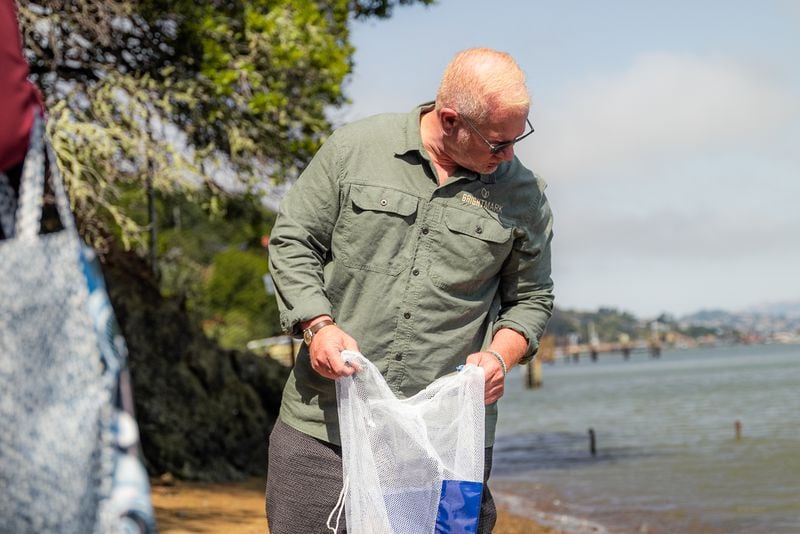A California company on Tuesday announced plans to invest nearly $1 billion in Middle Georgia to build a factory that will take used plastic and turn it into the building blocks to make new plastics, while diverting hundreds of thousands of tons of waste each year from landfills.
Brightmark said its 2.5 million-square-foot facility in Thomaston, between Macon and Columbus, will have the capacity to keep some 400,000 tons per year of plastic from ending up in landfills, incinerators or left floating in waterways. The future $950 million plant in Upson County, about 65 miles south of downtown Atlanta, will employ 200 workers with an average salary of about $51,500, the company said.
Construction is expected to start in 2025 with the facility opening in 2027.
The Brightmark project is the latest clean tech project to land in Georgia amid a wave of investment in the sector. This is also the second time Brightmark has attempted to build a plastic recycling facility in Georgia.
An earlier attempt in Macon ended after community pushback related to environmental concerns and worries about how diesel fuel would be one of the products created through the recycling process. Brightmark founder and CEO Bob Powell said in an interview that no fuel will be produced at its Thomaston plant.
The factory also will not burn plastics. Instead, Powell said Brightmark’s proprietary technology breaks the plastics down to its basic components for reuse as future plastic materials. Recycling reduces the need to drill fossil fuels to manufacture new plastics.
A study by the National Renewable Energy Laboratory in 2022 found that some 95% of plastics in the U.S. are not recycled. Brightmark said its technology can break down and recycle plastics, including hard-to-recycle ones from industrial settings. Brightmark will also accept plastics from residential waste management companies.
Most plastics are derived from fossil fuels and the production process is responsible for a sizeable chunk of global emissions of greenhouse gases that are warming the planet. A recent study by researchers at the Lawrence Berkeley National Laboratory found production of the main types of plastic is responsible for around 5% of heat-trapping emissions worldwide.
Most plastics end up in landfills, waterways and the world’s oceans, where they break down into smaller and smaller particles, with dire impacts on wildlife, ecosystems and even human health.
Powell, a Georgia native, founded the company in 2016. The “Circularity Center,” as the facility is called, will be Brightmark’s second plastics recycling plant in the U.S. and will be able to recycle about four times as much plastic as the company’s initial center in Indiana.
The centers are part of the company’s mission to “imagine a world without waste,” he said.
“It’s really important that we be great members of the community and environmental stewards,” he said.
Credit: Special
Credit: Special
Brightmark will invest $1 million in a “Zero Liquid Discharge” system that will treat and recirculate water used in the plastics recycling process and will not be discharged into the local wastewater system or area waterways. The company will also spend $20 million on infrastructure projects to improve road, rail and utility services to the project site near the Thomaston-Upson County Airport.
The plant, Powell said, will be considered a “synthetic minor emitter,” and the company said it will use the “best available technologies to reduce emissions” and will apply for required environmental permits from state and federal agencies.
Powell said his company has been working with Thomaston and Upson officials for nearly two years to build the Circularity Center.
Upson County has historically been a textile manufacturing hub, best known for linen maker Thomaston Mills, which still operates a facility in the area but is based in Pennsylvania. Though textile manufacturing remains a big part of the county’s identity, it isn’t the economic driver it once was.
Upson County Chairman Norman Allen said Brightmark is the county’s largest-ever corporate recruitment and will help diversify the community’s economy. If successful, the plant will nearly double the property tax base.
Local leaders were aware of the pushback Brightmark faced in Macon, and Allen said local officials worked with the company to address environmental concerns. Allen said he and other local leaders toured Brightmark’s Indiana plant and met with leaders and residents there to learn about the operations and community impact.
“To me this is a no-brainer for the state and community to embrace,” he said. “We’re taking something of little value in plastic waste and turning it into something of value.”
Allen also said he hopes the project will help attract other industry.
“Turning dirt gets attention,” he said.
The company will be eligible for various state and local incentives, but figures were not released Tuesday.
Powell, a Georgia Tech graduate, said jobs at the plant will include advanced manufacturing, maintenance and white-collar roles.
“This investment in Georgia represents a commitment to supporting economic longevity and playing an integral role in building a sustainable future together in my home state,” he said in a news release. “We’re thrilled to be able to offer a circular solution that will make a positive environmental and economic impact on a region so near and dear to my heart.”
-Staff writer Drew Kann contributed to this report.
A note of disclosure
This coverage is supported by a partnership with Green South Foundation and Journalism Funding Partners. You can learn more and support our climate reporting by donating at ajc.com/donate/climate/
About the Author








